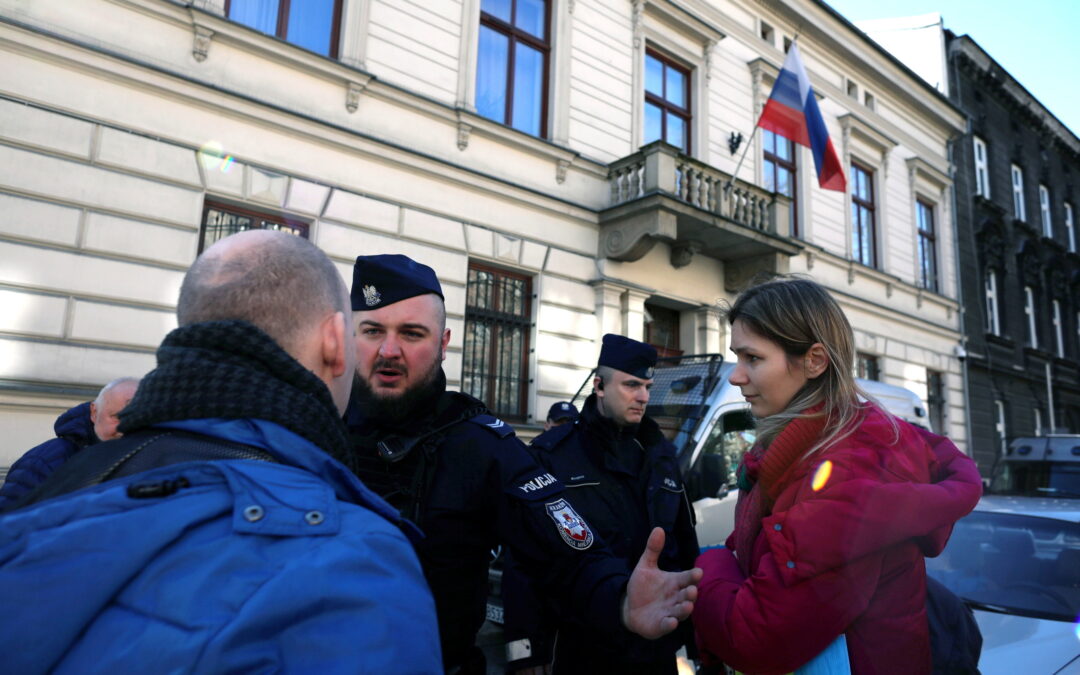Keep our news free from ads and paywalls by making a donation to support our work!

Notes from Poland is run by a small editorial team and is published by an independent, non-profit foundation that is funded through donations from our readers. We cannot do what we do without your support.
Poland has announced that it will close Russia’s consulate in the city of Kraków in response to evidence that Moscow was behind the fire that last year destroyed Warsaw’s largest shopping centre. It is the second Russian consulate that Poland has closed due to Moscow’s campaign of sabotage.
“Due to evidence that the Russian security services committed a reprehensible act of sabotage against the shopping centre on Marywilska Street, I have decided to withdraw my consent for the operation of the consulate of the Russian Federation in Kraków,” announced foreign minister Radosław Sikorski.
W związku z dowodami, że to rosyjskie służby specjalne dokonały karygodnego aktu dywersji wobec centrum handlowego przy Marywilskiej, podjąłem decyzję o wycofaniu zgody na działanie konsulatu Federacji Rosyjskiej w Krakowie.
— Radosław Sikorski 🇵🇱🇪🇺 (@sikorskiradek) May 12, 2025
His announcement on Monday morning – the first anniversary of the fire that destroyed the Marywilska 44 shopping centre in Warsaw – came after Prime Minister Donald Tusk had on Sunday evening announced that Poland was now certain Russia was responsible for the arson attack.
“We already know for sure that the large fire at Marywilska was the result of arson ordered by the Russian security services,” wrote Tusk. “The activities were coordinated by a person in Russia. Some of the perpetrators are already in custody, the rest have been identified and are being sought. We will catch them all!”
That was in turn followed by a joint statement from the interior and justice ministers providing further details of the investigation into the fire and Russia’s responsibility for it.
Poland says it now "knows for sure" that the fire which last year destroyed Warsaw's largest shopping centre "was the result of arson ordered by Russia".
Some of the perpetrators are already in custody, says @donaldtusk https://t.co/m7lVAwJrVQ
— Notes from Poland 🇵🇱 (@notesfrompoland) May 12, 2025
Last October, Sikorski ordered Russia to close its consulate in the city of Poznań and declared its staff personae non gratae in Poland in response to various forms of “hybrid warfare” by Moscow against Poland, including sabotage, cyberattacks and migratory pressure on its eastern border.
In retaliation, Russia ordered the closure of Poland’s consulate in Saint Petersburg and expelled three diplomats working there. Russia continued to operate consulates in the cities of Kraków and Gdańsk, as well as its embassy in Warsaw.
After today’s announcement by Sikorski, the spokeswoman for Russia’s foreign ministry, Maria Zakharova, accused Poland of “deliberately seeking to ruin relations” and said that Moscow would “soon” announce an “appropriate response” to the consulate closure.
In 2022, local authorities in Kraków renamed the area outside the Russian consulate as “Free Ukraine Square” in a show of support for Kyiv. Shortly before that, Gdańsk took a similar step, opening Heroic Mariupol Square outside its Russian consulate.
Kraków today named an area outside the Russian consulate as "Free Ukraine Square".
It is the latest in a number of Polish cities to name public spaces in honour of Ukraine https://t.co/hAdCNPi87L
— Notes from Poland 🇵🇱 (@notesfrompoland) July 12, 2022
Last year’s fire at Marywilska in Warsaw was part of a series of acts of sabotage in Poland and other countries in the region that the authorities have blamed on Russia, whose intelligence services recruited and hired people living in those countries – often Ukrainian and Belarusian immigrants – to carry out the attacks.
In March this year, Poland charged a Belarusian national, named only as Stepan K. under Polish privacy law, with carrying out a terrorist arson attack in Warsaw on behalf of Russia. They noted that the fire was ignited in a very similar manner to the one at Marywilska, which took place just a month later.
They also revealed that the case against Stepan K. was linked to an investigation into other arson attacks on large stores not only in Poland but elsewhere in central and eastern Europe.

Notes from Poland is run by a small editorial team and published by an independent, non-profit foundation that is funded through donations from our readers. We cannot do what we do without your support.
Main image credit: Jakub Wlodek / Agencja Wyborcza.pl

Daniel Tilles is editor-in-chief of Notes from Poland. He has written on Polish affairs for a wide range of publications, including Foreign Policy, POLITICO Europe, EUobserver and Dziennik Gazeta Prawna.



















